Lockdown in Wales: Hairdressers to reopen but retail remains closed
Going to the hairdresser and meeting friends in a garden are all set to become legal again in Wales.
The Welsh Government is relaxing lockdown rules, with stay at home rules replaced by a requirement to stay local.
Up to four adults from two households will also be allowed to meet up in a private garden in Wales from Saturday.
Non-essential shops remain closed until 12 April, although garden centres can reopen from 22 March.
Wales' first minister also said self-contained accommodation would be allowed to reopen from 27 March, as long as cases remained low, but people can only go with their own household.
Mark Drakeford warned any further reopening in tourism would be halted if holiday providers took bookings from outside of Wales.
The Welsh Conservatives accused the first minister of a U-turn over retail, which Mr Drakeford denied, while Plaid Cymru said Welsh ministers had raised false hopes with businesses.
Shielding for clinically extremely vulnerable people will also be paused from 1 April.
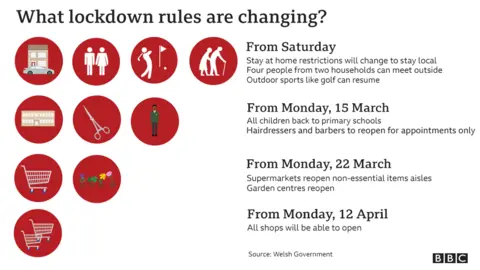
For people living in England, the "stay at home" rule will end on 29 March but holidays within the UK will not be allowed until 12 April at the earliest.
What does 'stay local' mean?
Wales' "stay at home" law will switch to "stay local" on Saturday and there will be guidance on what that means, according to where you live.
It is only likely to last for two weeks, however, ending on 27 March if conditions allow.
"The rule of thumb is that you should think of local as a five-mile radius from where you live," Mr Drakeford said.
"But if you live in a valleys community or a rural area you can exercise your judgement and go a little bit further."
Dyfed-Powys Police Federation representative Roger Webb said forces had not been given any information ahead of the announcement on how officers should engage on the new rules and enforce them.
He said they would use common sense and work "in the best way possible" to make them effective.
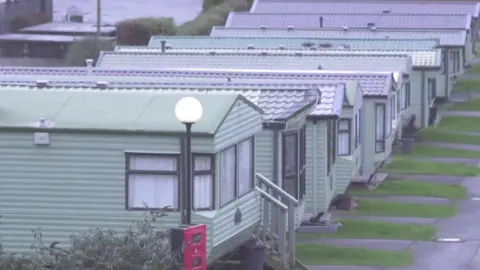
South Wales Police urged people to take responsibility for their actions and "to do the right thing".
"As some restrictions ease, there will be people looking to push the boundaries and break the rules. My plea to them is don't," said police and crime commissioner Alun Michael.
What restrictions will be lifted?
From Saturday, 13 March:
- "Stay at home" becomes "stay local"
- Four people from two different households can meet up outdoors to socialise, including in gardens - children are excluded from the number. Mr Drakeford said the rules would allow people to walk through a house to access the garden
- Outdoor sports facilities such as golf, tennis and basketball will be able to reopen. A maximum of four people from two household can take part in activities
- Designated solo visitors can enter care homes
From Monday, 15 March:
- All primary school children and those in qualifications years can return to class
- Schools will have flexibility to bring back year 10 and 12 pupils and more students will return to colleges
- Hairdressers and barbers can reopen for appointments only
- Leafleting can begin for the Senedd election
From Monday, 22 March:
- Restrictions on non-essential aisles in supermarkets will be lifted
- Garden centres to reopen
From Saturday 27 March, if case rates remain low:
- Libraries and self-contained accommodation can reopen, but you can only holiday with people from your own household.
- Organised children's activities can restart
- Stay local restrictions will be lifted
The Welsh Government also wants to reopen all shops and remaining close-contact services from 12 April, if the situation continues to improve.
Mr Drakeford said he was taking a "careful and cautious" phased approach to lifting restrictions.
"If we do too much too quickly, we will lose control of the virus and set off a new wave of infections," he said.
"And then we would be back at the beginning again, having to re-impose strict measures to protect people's health and save lives."
What do hairdressers say?

Vicky Lewis, who owns Vicki's Salon and Kidz Cutz in Llanelli, Carmarthenshire, welcomed the news after another lockdown that had been "horrendous, boring and stressful".
"I have had my salon for 22 years so I've been desperate to work," she said.
"It is also really worrying as you don't know if you still have your clients. It feels like I'm starting over again."
Now she is looking forward to trying to repair the same "overgrown and scary haircuts" she saw after the first lockdown.
Mr Drakeford defended reopening hairdressers before all children were back in school.
He said "schools are our top priority", and the scientific advice was clear that the safest way to get children back in class was to do so gradually.
When will shops open?
Mr Drakeford previously said ministers would look to "begin to reopen some non-essential retail" at this review.
However, that will now begin on 22 March when garden centres can reopen and supermarkets remove the wrapping from their non-essential items aisles.
All other shops are expected to reopen from 12 April and the Welsh Government says it is making an extra £150m available to support businesses affected by ongoing restrictions.
Sara Jones, head of the Welsh Retail Consortium, said the delayed reopening of shops was "deeply frustrating" with the industry losing £100m every week in revenue during lockdown.
"At the last review the first minister opened the door for a possible reopening on Monday and many retailers have taken the leap and invested in their stores and furloughed staff in preparation," she said.
Ms Jones, who is a Conservative councillor in Monmouthshire, added: "[This delay] will simply exacerbate the woes of a stricken industry."
Mr Drakeford told his press conference that he did not "change" his mind on the timetable for reopening non-essential retail.
"Three weeks ago I said that I hoped today we would be able to begin to reopen non-essential retail and that is exactly what we have been able to do," he said.
He said he was "anxious" about reopening non-essential retail in Wales ahead of the same shops being reopened in England.
The first minister said it could act "as a perverse incentive for people to travel across the border."
Non-essential retail in Wales is scheduled to reopen on 12 April, the same date as England.
He added it was "safer" to lift the ban on shops, including supermarkets, from selling non-essential items ahead of fully reopening shops that have been closed.
Garden centre bosses had been frustrated by having to close in lockdown while centres in England remained open.
Nicola Pugh, senior operations manager at Pugh's Garden Village in Cardiff, said she was "delighted" at being given the go-ahead to reopen.
 Pugh's Garden Village
Pugh's Garden VillageShe said they had continued to grow plants locally at their nurseries so they were able to stock their centres in Radyr and Wenvoe.
"We are ready and waiting and have been working hard to ensure safe shopping for all our wonderful customers," Ms Pugh added.
When will shielding end in Wales?
Shielding in Wales for people vulnerable from coronavirus will be paused from 1 April.
The Health Minister Vaughan Gething said with cases lower than December "we must only keep this advice in place for as long as is absolutely necessary".
"In light of the change of context, the Chief Medical Officer has recommended that the advice to the clinically extremely vulnerable to follow shielding measures should be paused after the 31st March," Mr Gething wrote.
When will pubs, restaurants and gyms reopen?
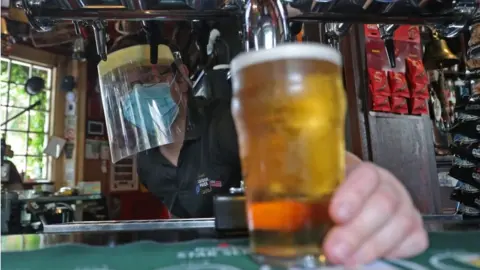 PA Media
PA MediaHospitality firms and gyms have not yet been given a date to reopen.
At his press conference on Friday Mr Drakeford indicated the sectors will be looked at in a future review during April.
He said as they look ahead to the end of that month "if we continue to see an improving public health picture, we will be able to consider what more we can do to support people to meet each other and what we can do to continue reopening our economy, for example, looking at outdoor hospitality, the wedding sector and leisure centres and gyms."
When will people be able to travel abroad?
 Getty Images
Getty ImagesThe first minister accepted he was powerless to prevent people in Wales from travelling abroad if the UK government follows through on its plan to fully reopen foreign travel from 17 May.
But he said he was "asking UK ministers to think very carefully" about allowing foreign travel as early as that date.
"In September we had a really difficult period in Wales because people were coming back from all parts of Europe... bringing infection with them," he said in an interview.
"I really don't want everything we have done together, the sacrifices we have made, to be put at risk by an importation of the virus."
What is the political reaction?
The leader of the Welsh Conservatives in the Senedd, Andrew RT Davies, welcomed the change to stay local.
But he said: "Labour's U-turn on the opening of non-essential retail at such short notice will be a hammer blow for many businesses, and the decision to now align with England in that area shows we could've adopted a similar roadmap weeks ago.
"The ongoing refusal by Labour ministers to do so will only increase frustration in the sectors worst hit by the pandemic and will put more Welsh jobs at risk."
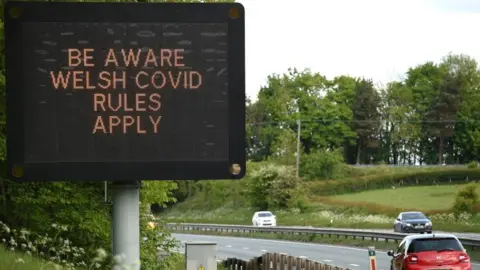 Getty Images
Getty ImagesPlaid Cymru leader Adam Price said there had been "poor communication" with non-essential retailers by the Welsh Government that he said had "certainly raised false hopes amongst many businesses" that they would open earlier.
He told BBC Wales those firms had incurred costs "getting ready for opening on Monday and now they're not going to be able to do that".
Plaid also called for families to be allowed to meet from different households before tourism reopens.


Three weeks ago Mark Drakeford said that today he would be looking at beginning the process of re-opening non-essential retail.
Sticking to those words, that's exactly what he's done, but there were a lot of non-essential retailers who thought they would get more.
There will be real anger that he allowing shops which have stayed open, and that includes the big supermarkets, to start selling non-essential goods before small privately owned shops are allowed to.

What are Wales' case rates?
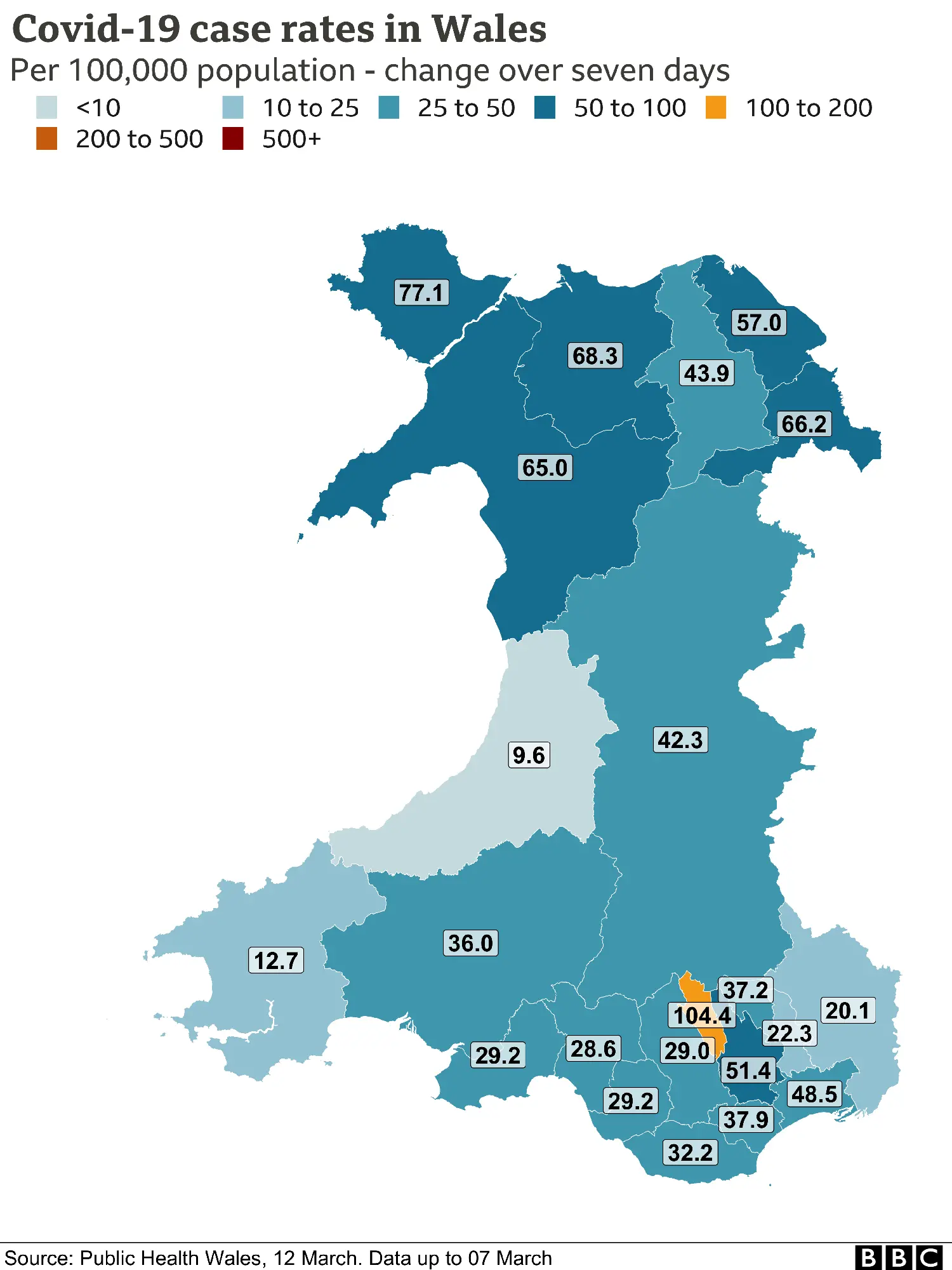

For a period in December, the case rate in Wales was one of the highest in the world - and lockdown was brought in just before Christmas.
However, the rate has fallen significantly during the restrictions and as the vaccination programme is rolled out - it is now at 41 cases per 100,000 people.
It remains below the 50 cases per 100,000 "circuit-breaker" threshold.
What does it look like in the rest of the UK?
In England, all restrictions will be lifted by 21 June at the earliest, as part of a four-stage "roadmap" based on certain conditions being met, such as a successful vaccine rollout.
Scotland has announced that more people will be able to meet up outside from Friday, 12 March, which is earlier than expected.
Meanwhile, Northern Ireland is still to outline its plans to relax restrictions.

 Getty Images
Getty Images
What would you change if you were in charge of Wales?
If you had the chance to run Wales, what would be the first thing on your list of things to do? We want to hear what matters to you and why you think it should be sorted.
As politicians across Wales gear up to get your vote in the Welsh Parliament election on 6 May, tell us what the things are that really matter to you and why you think they should be prioritised?
Use this form to send us your suggestions:
If you are reading this page on the BBC News app, you will need to visit the mobile version of the BBC website to submit your question on this topic.
